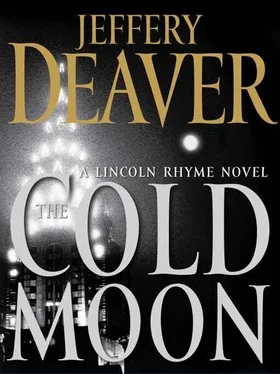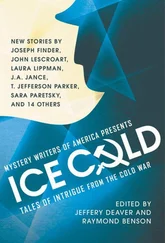Now, what've we learned?
Ron Pulaski, accustomed to thinking we because of the twin thing, asked himself this question.
Meaning: What've I learned in working on this case with Rhyme and Sachs?
He was determined to be the best cop he could and he spent a lot of time evaluating what he'd done right and what he'd done wrong on the job. Walking down the street now toward the old grocery store where Sachs was meeting with Wallace, he couldn't really see that he'd messed up anything too bad on the case. Oh, sure, he could've run the Explorer scene better. And he was damn sure going to keep his weapon outside the Tyvek jump-suit from now on-and not use choke holds, unless he really had to.
But on the whole? He'd done pretty good.
Still, he wasn't satisfied. He supposed this feeling came from working for Detective Sachs. That woman set a high bar. There was always something else to check out, one more clue to find, another hour to spend on the scene.
Could drive you crazy.
Could also teach you to be one hell of a cop.
He'd really have to step up now, with her leaving. Pulaski'd heard that rumor, of course, and he wasn't very happy about it. But he'd do what was necessary. He didn't know, though, that he'd ever have her drive. After all, at the moment, hurrying down the freezing street, he was thinking of his family. He really wanted just to head home. Talk to Jenny about her day-not his, no, no-and then play with the kids. That was so fun, just watching the look in his boy's eyes. It changed so fast and so completely-when his son noticed something he'd never seen before, when he made connections, when he laughed. He and Jenny would sit on the floor with Brad in between them, crawling back and forth, his tiny fingers gripping Pulaski's thumb.
And their newborn daughter? She was round and wrinkled as an old grapefruit and she'd lie nearby in the SpongeBob bassinet and be happy and perfect.
But the pleasure of his family would have to wait. After what was about to happen, it was going to be a long night.
He checked street numbers. He was two blocks from the storefront where he'd be meeting Amelia Sachs. Thinking: What else've I learned?
One thing: You damn well better have learned to steer clear of alleys.
A year ago he'd nearly been beaten to death because he'd been walking too close to a wall, with a perp hiding around the corner of a building. The man had stepped out and walloped him in the head with a billy club.
Careless and stupid.
As Detective Sachs had said, "You didn't know. Now you do."
Approaching another alley now, Pulaski veered to the left to walk along the curb-in the unlikely event that somebody, a mugger or junkie, was hiding in the alley.
He turned and looked down it, saw the empty stretch of cobblestones. But at least he was being smart. That's the way it was, being a cop, learning these small lessons and making them a part of-
The hand got him from behind.
"Jesus," he gasped as he was pulled through the open door of the van at the curb, which he hadn't seen because he was staring into the alley. He gasped and started to call out for help.
But his assailant-Deputy Inspector Halston Jefferies, his eyes cold as the moon overhead-slapped his hand over the rookie's mouth. Somebody else grabbed Pulaski's gun hand and in two seconds flat he'd disappeared into the back of the van.
The door slammed shut.
The front door of the old grocery store opened and Marilyn Flaherty walked inside, closed the door behind her and latched it.
Unsmiling, she looked around the bleak store, nodded at the other officers and Wallace. Sachs thought she looked even more tense than usual.
The deputy mayor, playing it cool, introduced her to the IAD detective. She shook his hand and sat at the battered table, next to Sachs.
"Top secret, hm?"
Sachs said, "This's turned into a hornets' nest." She watched the woman's face carefully as she laid out the details. The inspector kept up the great stone face, giving nothing away. Sachs wondered what Kathryn Dance would see in her stiff-backed posture, the tight lips, the quick, cold eyes. The woman was virtually motionless.
The detective told her about Baker's partner. Then added, "I know how you feel about Internal Affairs but, with all respect, I've decided we need to bring them in."
"I-"
"I'm sorry, Inspector." Sachs turned toward Wallace.
But the deputy mayor said nothing. He simply shook his head, sighed, then glanced at the IAD man. The young officer pulled out his weapon.
Sachs blinked. "What…Hey, what're you doing?"
He trained the gun on the space midway between her and Flaherty.
"What is this?" the inspector gasped.
"It's a mess," Wallace said, sounding almost regretful. "It's a real mess. Both of you, keep your hands on the table."
The deputy mayor looked them over, while Toby Henson handed his own gun to Wallace, who covered the women.
Henson wasn't IAD at all; he was a detective out of the 118th, part of the inner circle of the extortion ring, and the man who'd helped Dennis Baker murder Sarkowski and Creeley. He now pulled on leather gloves and took Sachs's Glock from her holster. He patted her down for a backup piece. There was none. He searched the inspector's purse and removed her small service revolver.
"You called it right, Detective," Wallace said to Sachs, who stared at him in shock. "We've got a situation…a situation." He pulled out his cell phone and made a call to one of the officers in front, also part of the extortion scheme. "All clear?"
"Yep."
Wallace disconnected the phone.
Sachs said, "You? It was you? But…" Her head swivelled toward Flaherty.
The inspector asked, "What's this all about?"
The deputy mayor nodded at the inspector and said to Sachs, "Wrong in a big way. She had nothing to do with it. Dennis Baker and I were partners-but business partners. On Long Island. We grew up there. Had a recycling company together. It went bust and he went to the academy, became a cop. I got another business up and running. Then I got involved in city politics and we stayed in touch. I became police liaison and ombudsman and got a feel for what kind of scams worked and what didn't. Dennis and I came up with one that did."
"Robert!" Flaherty snapped. "No, no…"
"Ah, Marilyn…" was all the silver-haired man could muster.
"So," Amelia Sachs said, her shoulders sagging, "what's the scenario here?" She gave a grim laugh. "The inspector kills me and then kills herself. You plant some money in her house. And…"
"And Dennis Baker dies in jail-he messes with the wrong inmate, falls down the stairs, who knows? Too bad. But he should've been more careful. No witnesses, that's the end of the case."
"You think anybody's going to buy it? Somebody at the One One Eight'll turn. They'll get you sooner or later."
"Well, excuse me, Detective, but we have to put out the fires we've got, don't you think? And you're the biggest fucking fire I've got at the moment."
"Listen, Robert," Flaherty said, her voice brittle, "you're in trouble but it's not too late."
Wallace pulled on gloves. "Check the street again, tell them to get the car ready." The deputy mayor picked up Sachs's Glock.
The man walked to the door.
Wallace's eyes turned cold as he looked over Sachs and took a firm grip on the pistol.
Sachs stared into his eyes. "Wait."
Wallace frowned.
She looked him over, eerily calm under the circumstances, he thought. Then she said, "ESU One, move in."
Wallace blinked. "What?"
To the deputy mayor's shock, a man's voice shouted from the darkened back room, "Nobody move! Or I will fire!"
What was this?
Gasping, Wallace looked into the doorway, where an ESU officer was standing, his H amp;K machine gun's muzzle moving from the politician to Henson at the front door.
Читать дальше












